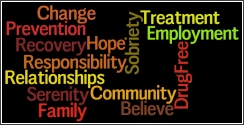 When one thinks of methadone treatment, they usually consider the power of methadone to eliminate opiate withdrawal and the value this has to someone fighting off withdrawal sickness.
When one thinks of methadone treatment, they usually consider the power of methadone to eliminate opiate withdrawal and the value this has to someone fighting off withdrawal sickness.
Methadone treatment actually consists of more than just the “medication assistance” component. Real treatment always addresses the underlying lifestyle, thinking, and behavioral elements that are a significant part of the addictive process. These areas are specifically addressed through counseling. All opioid treatment programs providing methadone in the United States are required to also offer counseling to their patients in order to help them achieve true and lasting success.
Some patients will need more counseling & emotional support than others. But all patients new to the recovery process will need to receive basic education on addiction as an illness, how to build a personal recovery program, and to have an opportunity to develop new coping and relapse prevention skills.
Methadone clinics in the U.S. vary in the ways that they deliver counseling services. Some programs are heavy on individual counseling while some focus more on a group therapy model. Often, programs will provide a blend of the two with optional family or collateral participation available as needed.
There is another important consideration with methadone treatment pertaining to the need to also treat “co-occurring disorders”. Co-occurring disorders consist of other psychiatric symptoms that merit special interventions and additional care. For example, many individuals dealing with an opioid addiction may also have struggled with chronic depression or anxiety. Unless these disorders are treated effectively, they can become stumbling blocks on the road to recovery, and can undermine a person’s sobriety success.
A number of methadone programs have in-house psychiatric services to address co-occurring disorders and to provide additional medications and/or therapy if required. Opioid treatment programs that do not have psyc services will typically refer a patient out to the local mental health center or a private provider who specializes in psychiatric care.
Methadone treatment has at times been presented as a harm reduction approach to dealing with severe addiction. In other words, reducing a person’s risk of overdose or exposure to other illnesses is a worthwhile goal. However, “harm reduction” alone does not represent all that recovery truly offers. There are many people who have found life long recovery through their introduction to methadone treatment. After becoming drug free, they went on to have families, start businesses, develop new careers, and enjoy a full life in the best sense.
The possibilities are limitless in recovery. Addiction is treatable. Methadone can be an important piece of the recovery journey. For many thousands of patients, it was the new start that they had hoped for.

 Follow
Follow

 When a woman is pregnant and addicted to opioids, she faces extraordinary stress and very often a wave of judgment from those around her that is emotionally painful and difficult to deal with. The criticism of others is understandable since no one wants to see an unborn baby placed at risk through the mother’s drug use. But this cauldron of angry emotion and public condemnation often overwhelms a pregnant mother, who may already feel guilty, and it pushes her further into isolation and inaction. This isolation only places the mother and unborn baby at greater risk of overdose and possible miscarriage.
When a woman is pregnant and addicted to opioids, she faces extraordinary stress and very often a wave of judgment from those around her that is emotionally painful and difficult to deal with. The criticism of others is understandable since no one wants to see an unborn baby placed at risk through the mother’s drug use. But this cauldron of angry emotion and public condemnation often overwhelms a pregnant mother, who may already feel guilty, and it pushes her further into isolation and inaction. This isolation only places the mother and unborn baby at greater risk of overdose and possible miscarriage. Since the launch of Methadone.US, hundreds of thousands of visitors have searched the site and located important treatment resources to help them deal with a chronic opioid addiction. The city pages on Methadone.US list both methadone clinics and local buprenorphine (suboxone) physicians.
Since the launch of Methadone.US, hundreds of thousands of visitors have searched the site and located important treatment resources to help them deal with a chronic opioid addiction. The city pages on Methadone.US list both methadone clinics and local buprenorphine (suboxone) physicians. Recovery is for everyone and anyone with a genuine desire for change. Treatment in a methadone program offers the potential for change, and a new path which can lead to a much improved life.
Recovery is for everyone and anyone with a genuine desire for change. Treatment in a methadone program offers the potential for change, and a new path which can lead to a much improved life.



